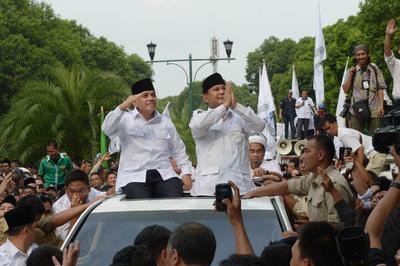The ideological spectrum typically applied to Indonesian politics places parties along a continuum from the ‘secular-nationalist’ PDI-P — which has championed the separation of religion and state — to the pseudo-Islamist parties that favour an enhanced role for Islam in governmental and policymaking processes, like the Prosperous Justice Party (PKS), United Development Party (PPP) and Crescent Star Party (PBB).
The parties that occupy the centre of this spectrum include Golkar, Partai Demokrat (PD), National Awakening Party (PKB) and PAN. These parties are all ‘Pancasila-ist’ (that is, they adhere to the official Indonesian ideology developed by Sukarno) according to their party statutes, but have been comparatively willing to compromise on Islam-inspired political agendas (PD and Golkar), or maintain constituent ties to Islamic mass organisations (PKB and PAN).
The more recently-established Gerindra, Hanura and Nasdem, lacking well-established parliamentary track records, are not as easily incorporated into this continuum. All were founded on pro-Pancasila platforms and boast sizeable non-Muslim memberships. However, a clause within the Gerindra party manifesto which purports to ‘protect religious purity’ has been criticised for over-reaching into religious affairs and threatening minority rights, suggesting a degree of openness within that party to more hardline Islamic agendas.
Following weeks of political manoeuvring, a plainly polarised pair of coalitions has emerged: an ostensibly pluralist alliance of PDIP, PKB, Nasdem, Hanura and the tiny PKPI behind Jokowi-JK, and a Prabowo-Hatta coalition of Gerindra, Golkar, PPP, PKS and PBB possessing a far more obvious ‘Islamic’ character.
While the coalitions themselves seem relatively ideologically consistent, the fact that one-time anti-establishment parties like PAN, PKS and the micro-party PBB have thrown their support behind a notorious New Order figure such as Prabowo could cast doubt on this coherence.
But rather than dismissing such an alliance as indicative of ‘promiscuous power-sharing’, it must be considered in light of the respective ideological orientations of Gerindra and PDI-P. While the former is a highly personalised vehicle for Prabowo’s presidential ambitions, and is therefore beholden to his own political leanings, PDI-P has longstanding ideological and socio-cultural traditions underpinning its political alignment.
It is worth recalling that the only major union of Islamic parties since democratisation — the short-lived ‘Poros Tengah’ of 1999 — was established to deny PDI-P matriarch Megawati Sukarnoputri the presidency. Fifteen years later, and notwithstanding internal wrangling in PPP over the ultimate direction of its support, it would appear that parties like PPP and PKS still naturally align against the ‘secular’, pluralist values represented by PDI-P and its cadre.
Prabowo has long displayed a chameleon-like ability to emphasise his nationalist, religious, cosmopolitan or commercial credentials where appropriate. Delivering another impressively impassioned speech at the announcement of his presidential ticket, Prabowo characterised his supporting coalition as comprising ‘religious parties and nationalist parties, though within those nationalist parties we find religiosity, and within those religious parties we find nationalism’.
Having spent months wooing foreign investors and the international commentariat prior to election season, he has since adopted a populist, ultra-nationalist rhetoric which he believes will improve his domestic appeal. When working with his coalition allies, Prabowo will play up his willingness to accommodate Islamic political agendas.
The announcement of the Jokowi-JK ticket contrasted sharply with the heavily religious tone of the corresponding Prabowo-Hatta event. Held outside a museum which displays artefacts from Indonesia’s national struggle, it featured the Christian Papuan musician and PDI-P member Edo Kondologit performing a series of nationalist songs. There was little religiosity on display, and the climax of the ceremony had Jokowi and Kalla kissing the national flag.
While Jokowi has sought to augment his Islamic credentials with plenty of photo opportunities at mosques on the campaign trail, there can be no question that he represents the pluralist presidential alternative: a status very much consistent with his position as a PDI-P protégé. One reason for the selection of Kalla as Jokowi’s running-mate is his perceived capacity to reassure Muslim voters, a portion of whom apparently remain unconvinced of the Jakarta governor’s responsiveness to their needs.
Much now depends on how effectively the party vehicles can be harnessed in support of their chosen presidential hopefuls, and how successfully the candidates can spruik their platforms and personal appeal.
As things stand, Prabowo is comfortably out-performing Jokowi on this front. While Jokowi has struggled to inject energy, enthusiasm and substance into his formal public appearances, Prabowo remains a highly effective campaigner on his chosen platform: ultra-nationalism and pro-poor populism, now coloured by religious overtones. While PAN founder Amien Rais compared Prabowo’s oratory (and, less convincingly, his appearance) to that of Sukarno during the Prabowo-Hatta declaration, Jokowi has tended towards tweet-length speeches, generally eschewing meaningful public statements that articulate a clear vision for the next five years.
The choice for Indonesian voters is now quite clearly between a belligerent nationalist rhetorician backed by Indonesia’s more conservative political elements, and a low-key would-be reformer, supported by a fundamentally pluralist coalition, whose campaign has been treading water too long.
Tom Power is a PhD candidate at the Department of Political and Social Change, The Australian National University.
A longer version of this article was first published here on New Mandala.

